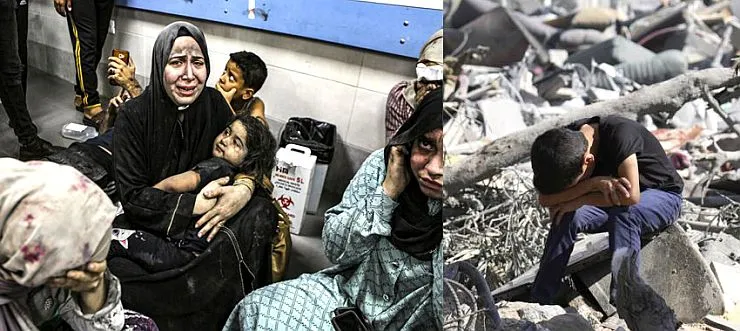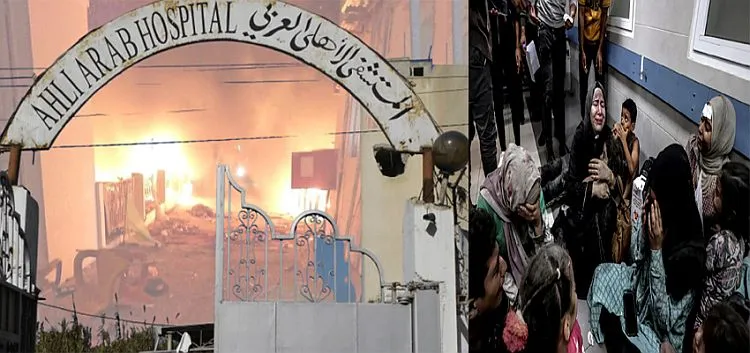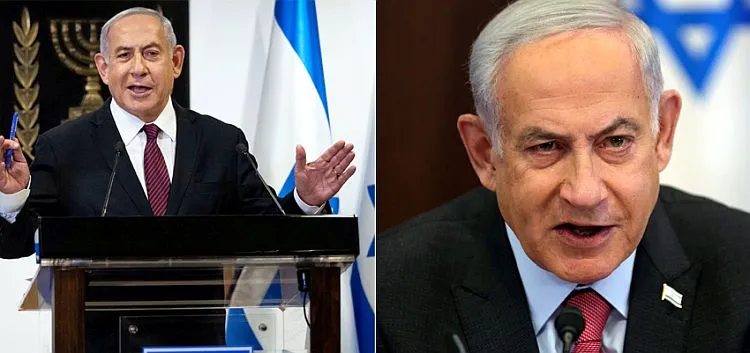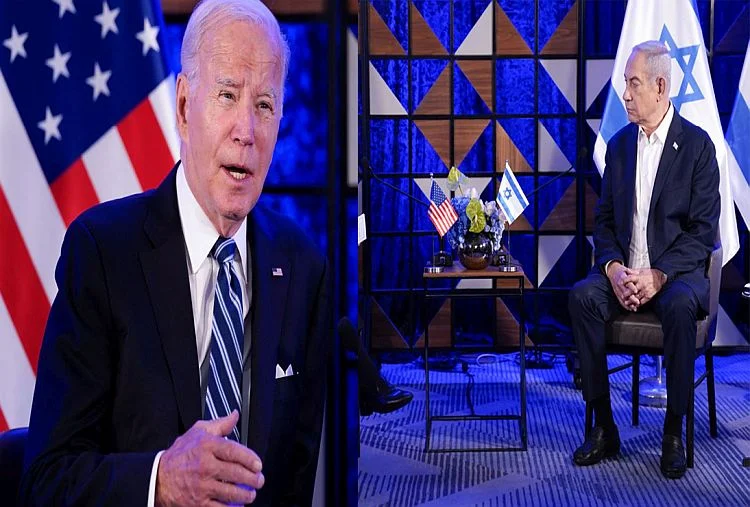Gaza City hospital
On Wednesday, Israel announced its decision to permit Egypt to provide restricted humanitarian assistance to the Gaza Strip. This marks the initial sign of relief in what had been a relentless 10-day blockade on the region.
This improvement follows a sad incident at a Gaza City hospital, wherein a devastating explosion claimed the lives of loads and positioned top notch stress on Gaza’s scientific professionals, who have been suffering to deal with the severa injured people because of the lack of scientific supplies.
U.S. President Joe Biden
The decision to permit the delivery of water, food, and other essential supplies occurred as anger over the explosion at al-Ahli Hospital on Tuesday night continued to resonate throughout the Middle East. This development coincided with the visit of U.S. President Joe Biden to Israel, aimed at averting a broader regional conflict.
Conflicting accounts emerged regarding the responsibility for the explosion. Hamas officials in Gaza promptly attributed it to an Israeli airstrike, asserting that hundreds had died.
Israel, however, denied involvement and offered a enormous quantity of video, audio, and different evidence, suggesting that the blast resulted from a rocket misfire with the aid of using Islamic Jihad, some other militant institution working in Gaza. Islamic Jihad, in turn, rejected this assertion.
United Nations
Following the rampage by Hamas militants in southern Israel on October 7, Israel imposed a complete halt on the supply of goods to Gaza. As a result, essential supplies have become increasingly scarce, forcing many families in Gaza to reduce their meals to just one per day.
This dire situation has also led to consuming contaminated water, prompting warnings from the United Nations about the imminent risk of starvation.
Al-Ahli Hospital
The tragic events at al-Ahli Hospital underscored the severe impact of the ongoing siege. With hundreds of wounded individuals in dire need of care, another hospital was stretched to its limits with dwindling supplies and fuel for its generators. In these challenging conditions, doctors had to perform surgeries on makeshift setups, often without anesthesia.
President Biden confirmed that Egypt’s president has agreed to open the border crossing and allow the entry of an initial convoy of 20 trucks carrying humanitarian aid. He also emphasized that the assistance would cease if Hamas intercepted or seized this aid. As stated by White House officials, the humanitarian relief operation is expected to commence on Friday at the earliest.
Egypt
Egypt is still repairing the road at the border, which Israeli airstrikes had damaged. Over 200 trucks loaded with approximately 3,000 tons of humanitarian aid are currently positioned at or near the Rafah crossing, which serves as Gaza’s sole link to Egypt. Khalid Zayed, the head of the Red Crescent for North Sinai, confirmed that these aid supplies are ready for transportation.
United Nations
The United Nations will oversee the entry of these supplies, as indicated by Egyptian Foreign Minister Sameh Shoukry in an interview with Al-Arabiya TV. When questioned about the possibility of foreigners and dual nationals being allowed to leave through the crossing, he stated, “As long as the corner is operating normally and the facility has been repaired.
The decision to allow the delivery of humanitarian aid was approved by Israeli Prime Minister Benjamin Netanyahu’s office in response to a request from President Biden. Israel has agreed not to obstruct the transport of food, water, or medicine from Egypt, provided these supplies are directed explicitly to civilians in the southern Gaza Strip and not to Hamas militants. However, there should have been a mention of giving much-needed fuel in the statement.
Israeli Prime Minister Benjamin Netanyahu’s
On Wednesday, rocket attacks from Palestinian factions in Israel resumed following a 12-hour pause. Meanwhile, Israel continued its military strikes on Gaza, even in areas in the southern part that had been designated as “safe zones” for civilians.
During his brief visit, President Biden aimed to strike a balance by expressing U.S. support for Israel and addressing the growing concerns among Arab allies. Upon his arrival, Biden showed solidarity with Prime Minister Netanyahu and expressed concern for the suffering of civilians in Gaza.
Biden stated that the hospital explosion did not appear to be the fault of Israel, and he cautioned Israelis not to let their anger over the deadly Hamas attack consume them.
President Biden
Jordanian Foreign Minister Ayman Safadi expressed concern that the ongoing conflict was dangerously escalating in the region. Following the hospital explosion, Jordan canceled a meeting to involve President Biden, Jordan’s King Abdullah II, and the presidents of Palestine and Egypt.
The Israeli military held a briefing on Wednesday morning, presenting its case for why it was not responsible for the explosion at al-Ahli Hospital. Spokesman Rear Adm.
Daniel Hagari stated that the Israeli military was not conducting any operations in the area when the blast occurred. He further explained that Israeli radar had confirmed a rocket barrage launched by the Palestinian militant group Islamic Jihad from a nearby cemetery at the time of the explosion, which was at approximately 6:59 p.m. Independent video footage also showed one rocket in the barrage falling out of the sky, supporting their case.
Gaza Northern Hospitals
The Anglican bishop of Jerusalem, Hosam Naoum, revealed that the hospital, operated by the Episcopal Church, had received at least three Israeli military orders to evacuate in the days leading up to the blast. He noted that Israeli shelling struck the hospital on Sunday, injuring four staff members. Last week, Israel had also issued orders for all 22 hospitals in northern Gaza to evacuate.
Readmore Gaza-Egypt border Humanitarian aid is stuck strains hospitals, water supply
Bishop Naoum refrained from assigning blame to either party for the explosion, emphasizing their desire to shed light on the ground realities and express the hope that people would recognize the need to end the ongoing conflict.
Young Children
Numerous Palestinian families sought refuge in al-Ahli Hospital and other medical facilities within Gaza City to escape bombardments. This came in response to Israel’s directive for all residents of the northern Gaza Strip to relocate to the southern areas. Following the explosion, video footage depicted the hospital premises littered with the remains of casualties, including many young children.
As the sun rose on Wednesday morning, the site of the blast was marred by charred vehicles, and the ground bore the scars of the explosion.
Mohammed al-Hayek, who had taken shelter in the hospital with his family, recounted the harrowing events. He mentioned that, on Tuesday night, he and a group of men were cautiously situated in a hospital stairwell, wary of venturing into the hospital yard. While he briefly left to fetch coffee, the devastating blast occurred.
“When I returned,” he said, “they were torn to pieces.”
The death toll figures are disputed. The Health Ministry initially reported a death toll of at least 500 but later revised it to 471. Meanwhile, Al-Ahli officials state that the toll is in the hundreds. According to the Gaza Health Ministry, since the beginning of the conflict, 3,478 people in Gaza have lost their lives, with over 12,000 wounded, primarily including women, children, and older people. Tragically, around 1,300 individuals across Gaza are believed to be trapped beneath the rubble, either alive or deceased, as per health authorities.
On the Israeli side, more than 1,400 people have been killed, primarily civilians who fell victim to Hamas’ deadly incursion, which also involved taking around 200 hostages into Gaza. Militants in Gaza have been launching rockets daily towards cities in Israel.
Israel has been expected to conduct a ground invasion of Gaza, but military officials have confirmed no official decision.
Due to the relentless Israeli airstrikes in the Gaza Strip, over one million Palestinians have fled their homes, representing roughly half of Gaza’s population. Those escaping from the north and Gaza City have sought refuge in overcrowded U.N. schools or with relatives. The ongoing airstrikes have left displaced Palestinians feeling increasingly unsafe, with no place seemingly free from danger.
Deir al-Balah
The Musa family sought refuge in the normally peaceful town of Deir al-Balah. They took shelter in a three-story home belonging to their cousin, located near the local hospital. However, at 7:30 p.m. on Wednesday, a series of explosions, believed to be airstrikes, severely damaged the building, reducing the family’s home to a pile of rubble. The family reported that approximately 20 women and children were buried under the debris.
Tragically, the lifeless body of Hiam Musa, the sister-in-law of Associated Press photojournalist Adel Hana, was recovered from beneath the collapsed structure on Wednesday evening. The family remains uncertain about the fate of others trapped under the rubble, whether alive or deceased.
Adel Hana expressed bewilderment, saying, “It doesn’t make sense. We went to Deir al-Balah because it’s quiet; we thought we would be safe.”
The Israeli military has stated that they are investigating the incident. They maintain that their operations target Hamas hideouts, infrastructure, and command centers while accusing militants of using civilians as cover.

















